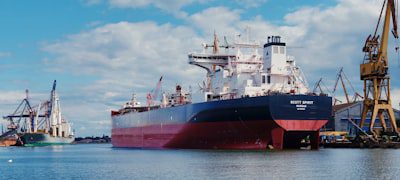
A Russian-owned tanker operated by Theia Trading has entered a state of limbo in the Gulf of Guinea, after failing to secure buyers for its fuel shipments amid growing geopolitical pressure. The vessel, named Ocean Jupiter, continues to search for a port of refuge, underscoring mounting difficulties for sanctioned Russian traders in West African waters.
The Ocean Jupiter, tied to Theia Trading, has been unable to offload its cargos anywhere in the region. Ports in Senegal and Togo reportedly refused docking rights, compounding its isolation at sea. With no viable destination yet, Ghana is being assessed as the next possible entry point for the tanker.
This freeze-out is linked to ongoing sanctions and diplomatic concerns, particularly following threats from former U.S. President Donald Trump to take action against Russian oil intermediaries supplying African markets
Despite no formal involvement from current U.S. leadership, Trump’s statements regarding enforcement of sanctions—and even tariffs—have sent ripples through the global fuel trade. Market actors in West Africa appear increasingly wary of receiving cargoes from entities under scrutiny, to avoid potential secondary sanctions or diplomatic fallout
The tanker is reportedly part of a so-called “ghost fleet”—ships maneuvering through loopholes in international sanctions via opaque ownership chains. These vessels, typically flagged under convenient registries, attempt to transport fuel through hidden pathways, but face increasing resistance from coastal states fearful of entanglement
Authorities in Senegal and Togo have declined to authorize port entry for the Ocean Jupiter. This reflects a broader caution among maritime regulators to avoid hosting vessels linked to contentious supply chains. Ghana remains the only potential exception, though its final decision is pending.
The standoff is more than a headline—it threatens regional fuel supplies. Delays in offloading can push up costs for downstream distributors, disrupt delivery schedules, and even reduce fuel availability in affected coastal markets. African importers are now facing uncertainty about sourcing and compliance risks.
While some West African states rely heavily on imported fuel, the desire to maintain legal integrity is leading them to err on the side of caution. National authorities see avoiding association with sanctioned actors as preferable to short-term economic relief from questionable deals.
The case highlights how geopolitical rhetoric—even when domestic—can influence global trade behavior. Traders and shipping firms operating in the grey zone of sanction evasion find themselves increasingly unwelcome at international ports, even where no formal restrictions exist.
If Ghana likewise refuses access, the Ocean Jupiter may continue drifting for weeks—or longer. The vessel’s operators face mounting financial risk from fuel degradation, crew costs, and escalating insurance concerns. Some expect diplomatic channels may be engaged to resolve the impasse.
The Ocean Jupiter saga underscores a new reality: sanctioned-linked traders are finding West African markets increasingly inaccessible, regardless of formal policy frameworks. Port closures, political pressure, and fear of inadvertent sanction breaches are reshaping maritime fuel trade in the region.
This episode may set a precedent, signaling that regional authorities prioritize compliance over convenience—and that geopolitical statements, even if unofficial, can redefine trade boundaries overnight.
for more news visit our website africapulsemedia.com